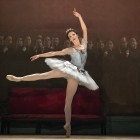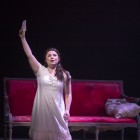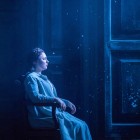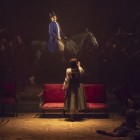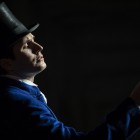Eugene Onegin 2018Scottish Opera
Read more about the opera Eugene Onegin
By the time this production received its first performance in Edinburgh it had been given nine times in the three other Scottish cities with touring theatres. Musically there was very little to complain about. Stuart Stratford had the orchestra playing gloriously, with all sorts of subtle variations in tempo and dynamic. He paced the final scene ideally, with Onegin's frenzied despair underlined by the orchestra at white heat. The chorus were placed quite far back on stage, but projected vividly in the two massed sequences - Tatyana's party and the St Petersburg ball. The only quibble perhaps came in the opening scene when the songs of the harvesters were less well projected, though the solo serf (not identified) came through clearly.
Natalya Romaniw has probably sung Tatyana more often than any other part in her repertoire - already seen at WNO and Garsington - and her interpretation will no doubt grace many of the world's stages in years to come. She is a tall, elegant presence on stage, ideal for the last act, while not overdoing the childish mannerisms earlier on, and the voice is quite superbly handled. She was well matched in her distinguished-looking and appropriatelty youthful and arrogant Onegin, Samuel Dale Johnson - a strong and well-schooled baritone who is also an excellent actor. The collapse of his character and personality in the despair of the final act was more gripping that most interpreters of the part seem to manage.
Peter Auty is slightly older than those two, which put him at a disadvantage as the impetuous, near-hysterical, Lensky. However, this was successfully disguised and he was a spirited dancer as well. His singing was quite outstanding. Sioned Gwen Davies made Olga into a fully three-dimensional character, even more undeserving of Lensky's love than usual. Alison Kettlewell, Anne-Marie Owens and Graeme Broadbent also made much of their roles. Indeed a feature of the staging as a whole was the extent to which the shorter parts stood out - the Captain and Triquet at the party, Zaretsky in the duel. None of the parts was in any way a cipher, which added to the overall sense of satisfaction.
The director's concept
As for the production, by Oliver Mears in designs by Annemarie Woods, it was, by and large, consistently thought through and accomplished. Pushkin's original was set in the period following shortly after Napoleon's invasion. Triquet's nostalgic little song is a deliberate throwback to the previous century. To update it all, as here, by nearly a century, was a risky stratagem, but it worked surprisingly well. Perhaps more of a challenge was the use of a single set - a large grey interior, derelict and dusty, a large stove to the left, lit in the second act to indicate change of season. There were two tall French windows to the right, an interior door in the back right hand corner, and a blank grey wall, which turned out to be a gauze scrim through which the chorus sang and some action could be observed. Even before the orchestra started, we saw an elderly lady in modernish costume - nineteen sixties perhaps? - who enters and surveys the scene in silence. This is Tatyana, evidently a survivor of the Revolution and fallen on hard times. Played by Rosy Sanders, she stays discreetly on stage for most of the performance, sometimes remembering events back in a far distant pre-Revolutionary golden age and sometimes sorting ideas in her own mind, imagining things she didn't actually witness, but which must have happened.
There were many clever touches There were no massed dance scenes. The peasant celebration in the first act and the Polonaise in the last were choreographed in classical style by Ashley Page for Eve Mutso, or at this performance, her alternate, Polina Guseva. His dance at the party was less demanding and performed by six characters, while the chorus commented from behind the scrim. Onegin partnered Olga, while Lensky danced with Tatyana, who was clearly by now more interested in the old family friend than in Onegin. The third couple showed a youthful Madame Larina distracted from the 'big picture' by the attentions of the handsome young Captain. Olga is shown to be a promiscuous flirt even before her interest is sparked in Onegin. At the start of the final scene, at the Gremins' palace in St Petersburg, we briefly see a nursemaid holding a young baby - a further reason for Tatyana to reject Onegin, even if his now degenerate manner and appearance weren't repellent enough.
And what of Onegin's horse? This handsome beast, as beautifully groomed as its master, dominated critical comment of the opening night in Glasgow, largely because of the copious quantities of dung he deposited centre stage. In Edinburgh his appearance was brief but immaculate.
This production should stay with the company as long as its very different, more traditional, predecessor (by David Pountney from 1979 to 1993). Whether the horse will return may depend on the availability of Mr Johnson or another baritone with suitable equestrian skills.
The 2017/18 season of Scottish Opera
It opened at the Edinburgh International Festival with a new production of Greek, the modern classic by Mark-Antony Turnage, which had its British premiere at the 1988 Festival. There were further performances in Glasgow in January. The main season began with a welcome and overdue revival of Sir David McVicar's powerful production of La traviata. In the New Year there were fresh stagings of another successful recent piece, Flight (Jonathan Dove) as well as Ariadne auf Naxos and Eugene Onegin. As a follow-up to the four operatic rareties mounted as Sunday concerts in 2016/17, the new subjects were rare Russian operas - Tchaikovsky's Iolanta, Prokofiev's Fiery Angel and a Rachmaninov double bill - Aleko and Francesca da Rimini. The fourth of these concerts was a digest of Russian pieces performed by students from the National Opera Studio under the title From Russia With Love. There was also the regular Highlights tour round the Highlands and Islands, this time in two phases, autumn and spring.
Performance Cast
- Tatyana Larina's elder daughter
- Olga Larina's younger daughter
- Madame Larina a widowed landowner
- Filipyevna nurse to the sisters
- Vladimir Lensky a neighbour, engaged to Olga
- Eugene Onegin Lensky's friend
- Zaretsky a retired officer
- Monsieur Triquet a Frenchman, tutor to the sisters
- Trifon Petrovich a captain
- Guillot Onegin's manservant
- Prince Gremin a retired general
Performance DatesEugene Onegin 2018
Theatre Royal, Glasgow | Glasgow
27 Apr, 19.15 29 Apr, 15.00 3 May, 19.15 5 May, 19.15
His Majesty's Theatre, Aberdeen | Aberdeen
10 May, 19.15 12 May, 19.15
Eden Court Theatre | Inverness
15 May, 19.15 17 May, 19.15 19 May, 19.15
Festival Theatre, Edinburgh | Edinburgh
23 May, 19.15 26 May, 19.15 29 May, 19.15 31 May, 19.15
Grand Opera House, Belfast | Belfast
28 Jun, 19.15 30 Jun, 19.15




